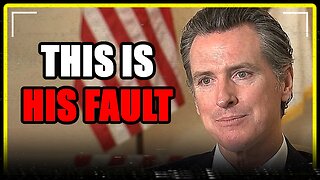Premium Only Content

Amazon's Monopoly Accusations and Their Ties to Government Entities: A Closer Look #Amazon
In recent times, Amazon, the e-commerce giant founded by Jeff Bezos in 1994, has come under growing scrutiny and faced allegations of engaging in monopolistic behavior. These allegations are closely linked to concerns surrounding the company's ties to governmental bodies. In this video, we will provide an in-depth exploration of Amazon's monopoly accusations and examine its connections with various government agencies.
Section 1: The Ascent of Amazon
To comprehend the allegations of Amazon's monopoly, we must begin by exploring its meteoric rise. Initially established as an online bookstore, Amazon rapidly evolved into an extensive e-commerce platform offering a diverse range of products. Its unparalleled expansion enabled Amazon to assert dominance across multiple sectors, encompassing online retail, cloud computing (Amazon Web Services or AWS), and logistics.
Section 2: Allegations of Monopoly
At the heart of the matter lies Amazon's substantial market influence. Critics contend that Amazon has exploited its dominant position to partake in anti-competitive practices such as predatory pricing, exclusive agreements, and prioritizing its proprietary products over those of third-party sellers on its platform. These allegations have prompted government investigations and ignited debates concerning whether Amazon genuinely qualifies as a monopoly.
Section 3: Amazon's Competitive Advantages
To gain a deeper understanding of the monopoly allegations against Amazon, it is imperative to scrutinize the factors contributing to its supremacy. Amazon's extensive customer base, expansive network of warehouses and distribution centers, and advanced data analytics afford it a substantial competitive edge. Furthermore, Amazon's Prime membership program has solidified customer loyalty and played a pivotal role in consolidating its market dominance.
Section 4: Connections with Government Entities
One of the most intriguing aspects of Amazon's narrative pertains to its affiliations with government agencies. Amazon has secured lucrative contracts with various government departments, including the Department of Defense. Additionally, the company's cloud computing arm, AWS, provides cloud services to governmental bodies, giving rise to concerns regarding potential conflicts of interest and preferential treatment.
Section 5: Influence on Policy Formation
Amazon's formidable lobbying endeavors have raised questions about its sway over policy formulation. The company has been proactive in advocating for its interests in areas such as taxation, labor regulations, and antitrust laws. Critics argue that Amazon's substantial financial resources enable it to shape policies in its favor, further solidifying its hold on the market.
Section 6: Investigations and Legal Controversies
Several investigations into Amazon's business practices have been initiated by government agencies, leading to legal battles and contentious disputes. These investigations hold the potential to reshape the landscape of e-commerce and determine whether Amazon has transgressed antitrust laws.
-
 LIVE
LIVE
Cewpins
3 hours agoSmoke Sesh🔥Gaming???💨420🍃!MJ !giveaway
42 watching -
 LIVE
LIVE
Phyxicx
1 hour agoShin Megami Tensei - Part 5 - 8/13/2025 | Chaos Route | Expert Difficulty
47 watching -
 1:59:32
1:59:32
vivafrei
11 hours agoEp. 277: Russia Peace Talks! Trump D.C. Takeover Leads to Lawsuit! Heat Wave Lawsuit? AND MORE!
40.7K29 -
 LIVE
LIVE
Nerdrotic
3 hours ago $1.58 earnedTransient Lunar Phenomenon: Deeper into the Mysteries of the Moon | Forbidden Frontier #112
543 watching -
 2:58:44
2:58:44
Barry Cunningham
1 day agoBREAKING NEWS: PRESIDENT TRUMP ABSOLUTELY TROLLS THE MEDIA! BIG WEEK AHEAD!
57.4K84 -
 1:37:28
1:37:28
Sarah Westall
3 hours agoReal Intel: Power Struggles Fueled by Blackmail, Surveillance & Coercion w/ Dr. Dave Janda
33.9K26 -
 9:49
9:49
MattMorseTV
5 hours ago $9.89 earnedNewsom's CAREER just WENT UP IN FLAMES.
29.8K66 -
 LIVE
LIVE
Spartan
3 hours agoHalo for a bit, Octopath after maybe
100 watching -
 3:49:55
3:49:55
sophiesnazz
5 hours ago $2.04 earned6kd in these lobbies !socials !specs
29.7K1 -
 1:42:00
1:42:00
Vedic compatability astrology
3 hours agoAbijit Shuckla: The Epic 8, 17, 25 Adventure!
12.3K1